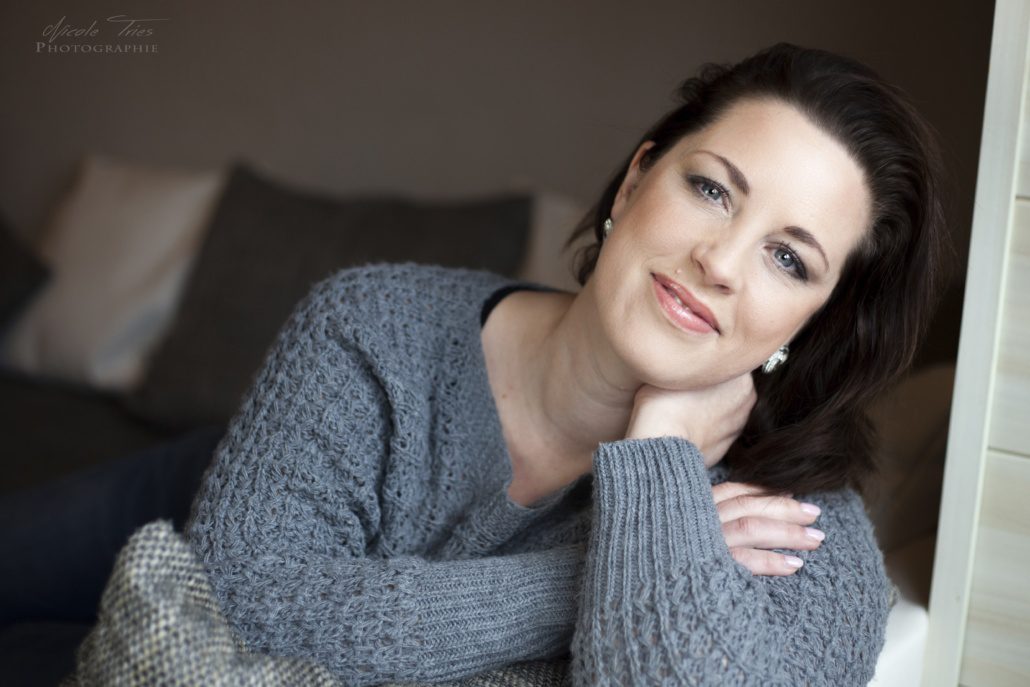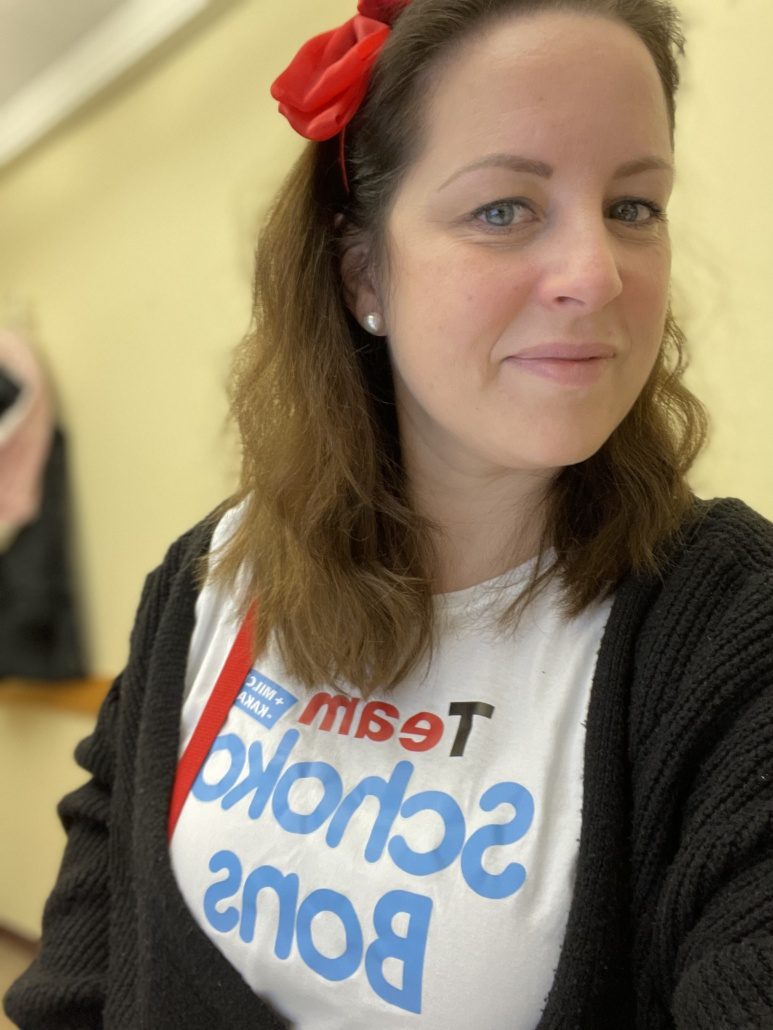Navigating Challenges and Rediscovering Confidence
Interview with Endometriosis Patient Nina
For many years, Nina grappled with a series of life-altering challenges. She not only had to endure an ectopic pregnancy and unsuccessful artificial inseminations but also coped with the heartbreaking loss of her husband to a severe illness. In this interview, we delve into her medical journey and her inspiring path to reclaiming normalcy.
Hello Nina. We appreciate your time for discussing endometriosis with us. Please introduce yourself.
Nina: My name is Nina, and I’m 40 years old, residing in Fischbach near Idar-Oberstein.
What does the term “endometriosis” mean to you?
Nina: To me, endometriosis signifies a prolonged battle filled with enduring pain.
Can you share your medical journey leading up to the definitive diagnosis, and what was the most challenging aspect for you during this period?
Nina: My first menstrual cycle began when I was 11, accompanied by significant pain. That was back in 1991 when endometriosis wasn’t commonly considered, and the pain was often dismissed as normal. In 2013, my husband and I decided to start a family, and I became pregnant quickly. Unfortunately, this joy was short-lived as I experienced an ectopic pregnancy requiring emergency surgery. It was during this time that endometriosis was finally diagnosed.
Were you satisfied with the level of attention and care provided by the medical professionals during this period?
Nina: Before receiving the diagnosis, I had been complaining to doctors for years about excruciating pain. I was often advised to rely on birth control pills to manage the discomfort. Even after the diagnosis, while the situation improved, I still felt like I was just being medicated with hormones.
What types of endometriosis were present in your case, and where were the lesions located?
Nina: The endometriosis lesions were primarily located on my intestines, fallopian tubes, and ovaries. They were initially removed in 2016. Unfortunately, I faced a significant setback when endometriosis cysts reappeared. In a grueling 7-hour surgery, these cysts, along with a portion of my bowel, were removed. During a follow-up, it was revealed that I had a rectovaginal fistula, necessitating further surgery. I underwent the creation of an artificial bowel outlet and had surgery every third day for weeks. After five months, my bowel could finally be repositioned.
Did the medical professionals adequately inform you about the potential complications that could arise after repositioning the intestine?
Nina: Yes, I received comprehensive care at the time, including the guidance of an ostomy nurse with prior experience in intensive care.
Why do you believe that endometriosis continues to be underestimated as a medical condition today?
Nina: I think it is because many people don’t give it the attention it deserves. Severe menstrual pain is often dismissed as normal by doctors. Finding a skilled gynecologist who can genuinely offer help is a challenging task.
How did your social environment respond to your condition before and after the diagnosis? Did it also impact your work?
Nina: Following the major surgery in 2016, I faced significant work-related limitations. I was granted a severe disability card, which provides additional time off and certain benefits. However, my then-employer was uncooperative and even canceled my vacation. I complied with their decision and continued working. I have secured a job in the public sector, but I still have days when I can’t perform my duties. Another surgery is on the horizon, making the situation very challenging.
What are the current day-to-day limitations you experience?
Nina: I can no longer engage in activities I once enjoyed. The extensive abdominal scar makes physical exercise very difficult for me. Fortunately, my friends are highly understanding when I have to cancel plans, which provides a tremendous source of support.
Do you still desire to have children, or have you had to let go of that dream?
Nina: I had to relinquish my dream of having children after two unsuccessful artificial inseminations. Moreover, my husband’s sudden death due to lung cancer in 2016 marked the end of my attempts to conceive. The fertility treatments were extremely exhausting and stressful, involving not only injections but also lengthy trips to the fertility clinic. Last year, when I experienced cysts again, I decided to have my uterus removed.
I am genuinely sorry to hear about your difficult journey, which included battling your health challenges and the loss of your husband. It must have been incredibly challenging to endure all of this.
Nina: Yes, it was indeed a very trying period. In early 2018, I applied for rehabilitation, which was promptly approved. I embarked on a three-week rehab program, but I felt that it was not enough. I sensed that I might not be receiving the comprehensive help I needed there, so I plan to try rehab again, this time at a different facility.
What strategies have you found helpful in managing your endometriosis?
Nina: I prioritize rest whenever possible, and when I can’t rest, I often use a hot water bottle for comfort.
Throughout your journey with endometriosis, have you learned any specific lessons or insights that you would like to share with other women?
Nina: I would like to emphasize that women should never give up. If doctors dismiss their symptoms, they shouldn’t be discouraged and should continue seeking answers. There are days when one doesn’t feel well, and during those times, it’s essential to take a break and resume the journey the next day.
What are your hopes and aspirations for the future regarding endometriosis?
Nina: I hope for increased awareness and more research to develop alternative treatment options beyond hormone-based approaches. I find it concerning that young girls, as young as 13 or 14, are prescribed birth control pills, even without endometriosis, solely for skin issues. Hormones can have a significant impact on the body, and I believe that health insurance companies should provide more support in this regard.
I have noticed that social media platforms are also contributing to a growing awareness of hormonal contraception. Some women share their experiences when they stop taking birth control pills, which raises awareness about the option of not using hormones unless there is a compelling reason.
Nina, how are you doing these days?
Nina: I’ve been off hormones for a year now, and the cysts have returned. It didn’t happen right away; after my hysterectomy in July last year, everything seemed fine for a while. However, at the beginning of this year, I started experiencing symptoms again, and I’m scheduled for another surgery.
I wish you all the best for the upcoming operation, and I sincerely hope you experience an improvement in your symptoms soon.
- “Take yourself and your endometriosis seriously. You are not imagining things!” - 7. November 2023
- Interview with Endometriosis Patient Nina - 7. November 2023
- Interview with Endometriosis Patient Nina - 7. November 2023


